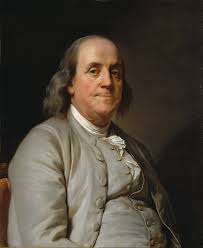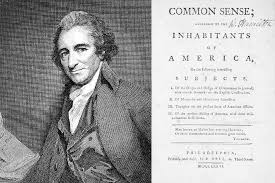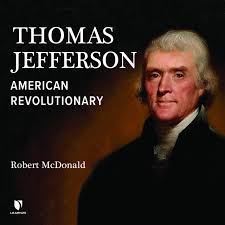2-The Birth of American Nation in Literature
| Site: | Plateforme pédagogique de l'Université Sétif2 |
| Cours: | History of American Literature |
| Livre: | 2-The Birth of American Nation in Literature |
| Imprimé par: | Visiteur anonyme |
| Date: | dimanche 15 février 2026, 01:59 |
Description
1-Important Writers and their Contributions
As dissatisfaction with the colonial system and the relations with Britain grew, the literature gradually changed its shape. The writers became more politically, anti-British and revolutionary oriented. Accordingly, rationalism and enlightenment prevailed. Essays, speeches and pamphlets became more important, the Puritans’ religious poetry fell out of favor as man was not considered naturally sinful any longer.
The most important writing in 18th century America was done by the Founding fathers who led the revolution of 1775-1783. They admired the European “Age of Reason” or “Enlightenment”. They shared the Enlightenment belief that human intelligence or reason could understand both nature and man.
Unlike the puritans, who saw man as a sinful failure, the Enlightenment thinkers were sure that man could improve himself. According to Stanford Encyclopedia of Philosophy,
The Enlightenment is not a historical period, but a process of social, psychological or spiritual development, unbound to time or place. Immanuel Kant defines “enlightenment” in his famous contribution to debate on the question in an essay entitled “An Answer to the Question: What is Enlightenment?” (1784), as humankind’s release from its self-incurred immaturity; “immaturity is the inability to use one’s own understanding without the guidance of another.” Expressing convictions shared among Enlightenment thinkers of widely divergent doctrines, Kant identifies enlightenment with the process of undertaking to think for oneself, to employ and rely on one’s own intellectual capacities in determining what to believe and how to act. Enlightenment philosophers from across the geographical and temporal spectrum tend to have a great deal of confidence in humanity’s intellectual powers, both to achieve systematic knowledge of nature and to serve as an authoritative guide in practical life. (Bristow)
The 18th-century American Enlightenment was a movement marked by an emphasis on rationality rather than tradition, scientific inquiry instead of unquestioning religious dogma, and representative government in place of monarchy. Enlightenment thinkers and writers were devoted to the ideals of justice, liberty, and equality as the natural rights of man.
-BENJAMIN FRANKLIN (1706–1790)
1. Important Writers and their Contributions
1-Important Writers and their Contributions
As dissatisfaction with the colonial system and the relations with Britain grew, the literature gradually changed its shape. The writers became more politically, anti-British and revolutionary oriented. Accordingly, rationalism and enlightenment prevailed. Essays, speeches and pamphlets became more important, the Puritans’ religious poetry fell out of favor as man was not considered naturally sinful any longer.
The most important writing in 18th century America was done by the Founding fathers who led the revolution of 1775-1783. They admired the European “Age of Reason” or “Enlightenment”. They shared the Enlightenment belief that human intelligence or reason could understand both nature and man.
Unlike the puritans, who saw man as a sinful failure, the Enlightenment thinkers were sure that man could improve himself. According to Stanford Encyclopedia of Philosophy,
The Enlightenment is not a historical period, but a process of social, psychological or spiritual development, unbound to time or place. Immanuel Kant defines “enlightenment” in his famous contribution to debate on the question in an essay entitled “An Answer to the Question: What is Enlightenment?” (1784), as humankind’s release from its self-incurred immaturity; “immaturity is the inability to use one’s own understanding without the guidance of another.” Expressing convictions shared among Enlightenment thinkers of widely divergent doctrines, Kant identifies enlightenment with the process of undertaking to think for oneself, to employ and rely on one’s own intellectual capacities in determining what to believe and how to act. Enlightenment philosophers from across the geographical and temporal spectrum tend to have a great deal of confidence in humanity’s intellectual powers, both to achieve systematic knowledge of nature and to serve as an authoritative guide in practical life. (Bristow)
The 18th-century American Enlightenment was a movement marked by an emphasis on rationality rather than tradition, scientific inquiry instead of unquestioning religious dogma, and representative government in place of monarchy. Enlightenment thinkers and writers were devoted to the ideals of justice, liberty, and equality as the natural rights of man.
-BENJAMIN FRANKLIN (1706–1790)

He is one of the most important figures of the period. He can be described as what we call a “renaissance man” – a person of many skills. He was a politician, scientist, philosopher, publisher, humorist, inventor and writer. David Hume called him America's "first great man of letters," who embodied the Enlightenment ideal of humane rationality.
One of Franklin’s important works is The Way to Wealth (1757) which gives the reader advice how to become successful. In addition, Franklin recorded his early life in his famous Autobiography (1771). He writes about his life, successes and failures, individualism. His style is very plain although he strongly disagreed with the opinions of the Puritans. For him, writing should have a practical purpose. He disliked poetry (High 15).
Extract from Franklin’s Autobiography
The most famous section describes his scientific scheme of self-improvement. Franklin lists 13 virtues: temperance, silence, order, resolution, frugality, industry, sincerity, justice, moderation, cleanliness, tranquility, chastity, and humility. He elaborates on each with a maxim; for example, the temperance maxim is “Eat not to Dullness. Drink not to Elevation”. For Humility, he said: “Imitate Jesus and Socrates”.
Franklin advocated “Practical literature” in his writing. One of his works is “The Dogood Papers” published in 1722. His early papers include moral advice; for instance, praising honesty and attacking drunkenness. Furthermore, in Poor Richard’s Almanac (1732-1757), he provided pieces of advice for farmers and sailors. These are some examples:
Lost time is never found again
Up sluggard, and waste not life; in the grave will be sleeping enough.
God helps them who help themselves
“Early to Bed, and early to rise, makes a Man healthy, wealthy, and wise.”
“Fools make Feasts, and wise Men eat them.”
“In short, the way to wealth, if you desire it, is as plain as the way to market. It depends chiefly on two words: industry and frugality. Waste neither time nor money, but make the best use of both. He that gets all he can honestly, and saves all he can, will certainly become rich.” Benjamin Franklin, The Way to Wealth
He invented one type of short prose which greatly influenced the development of a story telling form in America. It is called “hoax” or the “tall tale”. The latter is a story that is very difficult to believe which is based on exaggeration. (High 16-17)
In addition to practical literature, political journalism, that appeared before the Revolution, was a prominent type of writing in a birth of nation in American literature. It was mainly in the form of pamphlet instead of newspapers. In fact, the passion of Revolutionary literature is found in pamphlets. Among the early writers of political journalism, there was James Otis who used violent and offensive language to attack British policies in America. John Dickenson was also an outstanding author in this era.
Actually, pamphlet was the most popular form of political literature of the day. Over 2,000 pamphlets were published during the Revolution. The pamphlets thrilled patriots and threatened loyalists; they filled the role of drama, as they were often read aloud in public to excite audiences. American soldiers read them aloud in their camps; British Loyalists threw them into public bonfires.
THOMAS PAINE (1737–1809)

He was an English-born essayist and pamphleteer. His pamphlet “Common Sense” is a sharp critique of the colonial system and explains why the Americans should revolt against the English. It was written in powerful rhetoric and eloquence. These are some extract from the pamphlet:
“Small islands, not capable of protecting themselves, are the proper objects for kingdoms to take under their care; but there is something absurd, in supposing a continent to be perpetually governed by an island.” (Paine 8)
“Common sense will tell us, that the power which hath endeavored to subdue us, is of all others, the most improper to defend us.” (6)
“When I was teaching children I began every day writing this on the blackboard: "Do to others what you would like them to do to you", telling them how much better the world would be if everybody lived by this rule.” (6)
“For all men being originally equals, no one by birth could have the right to set up his own family in perpetual preference to all others forever, and tho’ himself might deserve some decent degree of honors of his contemporaries, yet his descendants might be far too unworthy to inherit them.” (9)
“Europe is too thickly planted with kingdoms to be long at peace; and whenever a war breaks out between England and any foreign power, the trade of America goes to ruin because of her connection with Britain…the advocates for reconciliation now will be wishing for separation …the weeping voice of nature cries ‘ tis time to part” (Paine 11).
Other writings of Thomas Paine include The Crisis and The Rights of Man which was mainly about defending the French Revolution.
-THOMAS JEFFERSON (1743–1826)

He was an architect, essayist, lawyer, politician, and later became the third president of the United States of America. His greatest contribution to the history of America is that he is the main author of the Declaration of Independence, which was adopted by the Continental Congress on 4th July 1776 during the War of Independence. For illustration, read the final section of the Declaration:
We, therefore, the Representatives of the United States of America, in General Congress, Assembled, appealing to the Supreme Judge of the world for the rectitude of our intentions, do, in the Name, and by Authority of the good People of these Colonies, solemnly publish and declare, that these united Colonies are, and of Right ought to be Free and Independent States; that they are absolved from all Allegiance to the British Crown, and that all political connection between them and the State of Great Britain, is and ought to be totally dissolved; and that as Free and Independent States, they have full Power to levy War, conclude Peace, contract Alliances, establish Commerce, and to do all other Acts and things which Independent States may of right do. And for the support of this Declaration, with a firm reliance on the protection of divine Providence, we mutually pledge to each other our Lives, our Fortunes and our sacred Honor.
Jefferson was deeply influenced by the ideas of the Enlightenment. For him, man should use his wisdom to improve his situation. He believed in the good nature of man. He says: “Nature has implanted in our breasts a love of others, a sense of duty to them, a moral instinct”. Yet, he was afraid that the commercial pressure of city life would destroy his goodness.
In writing the Declaration, Jefferson was influenced by the ideas of John Locke. It is free from emotional appeals. It is clear and logical representing the spirit of Enlightenment. In fact, The Declaration was revised 86 times before it was signed.
Throughout his entire life, Thomas Jefferson attacked slavery. He was publicly a consistent opponent of slavery. Calling it a “moral depravity” and a “hideous blot,” he believed that slavery presented the greatest threat to the survival of the new American nation (High 19).
2. American Literary Genres
Poetry:
The most popular poets and poems are as follows:
· Philip Freneau:
He was a poet and political journalist who advocated American independence through strong patriotic feeling. One of his works is Pictures of Columbus (1771) that attacked British tyranny.
He was captured and imprisoned in two British ships, where he almost died before his family managed to get him released. His poem “The British Prison Ship” is a bitter condemnation of the cruelties of the British. It is written:
Hunger and thirst to work our woe combine,
And mouldy bread, and flesh of rotten swine
Freneau supported Jefferson against the Federalists
In another work, The Wild Honey Suckle (1786), Freneau sheds light on Nature and human beings. He says:
For when you die, you are the same;
The space between, is but an hour,
The frail duration of a flower
The House of Night
Hills sink to plains, and man returns to dust,
That dust supports a reptile or a flower;
Each changeful atom…
Takes some new form, to perish in an hour.
In this era, poets of the revolutionary era imitated neoclassical style in terms of ideas and style.
They wrote in couplets and blank verse to represent the spirit of the age of reason.
· The Connecticut Wits
Hartford wit, also called Connecticut Wit, any of a group of Federalist poets centred around Hartford, Conn., who collaborated to produce a considerable body of political satire just after the American Revolution. (High 21). The Hartford Wits, all of them undoubted patriots, reflected the general cultural conservatism of the educated classes. They were the first poetic circle. They opposed the ideas of Thomas Paine and Thomas Jefferson. Most of them were Federalists in their politics and Calvinists in their religion
One of the Connecticut Wits was John Trumbull who was known for his satirical writing.
His poem was “The Progress of Dulness”. It was about the adventures of Tom Brainless who enters the university because he is too dull for vice. As a teacher, he “tries with ease and unconcern/ to teach what ne’er himself could earn”. Another famous poem was M’Fingal. It was a satirical work about the silly language used by public speakers.
· Timothy Dwight:
He was influenced by the style of Alexander Pope whose poetry represented Neoclassical style. One of his famous poems was “The Triumph of Infidelity”. It was mainly about the conflict between satan and human beings.
· Joel Barlow:
His famous works include: The Vision of Columbus which was a patriotic poem and The Hasty Pudding. The latter was a mock-heroic poem. It was written in neoclassical style to describe unimportant things like the style of Alexander Pope.
Drama:
Although some priests used theatre for religious teaching, drama developed very slowly in English colonies inasmuch as early settlers of Puritans regarded theatre as an “invention of the devil”. In the South, the first theatre was in Virginia. The first play was Thomas Godfrey’s Prince of Parthia (1759).
William Dunlap was regarded as the most outstanding dramatist in this era. His plays are The Father (1789) and André (1798) which is based on the story of a British spy.
Royal Tyler wrote the first American comedy The Contrast in 1787. It is mainly about a contrast between silly British manners and American new manners.
· Letters
The most dominant letters were written by James Hector John de Crevecoeur. He had French origins, and he was against the revolution because he was afraid that his life would be destroyed by the Revolution. His writings include Letters from an Ancient Farmer and Sketches of Eighteenth Century America (High 24-25)
As a result, many American literary texts in this era were mainly about political issues. Most importantly, the dominant literary types were pamphlets, poems and plays.